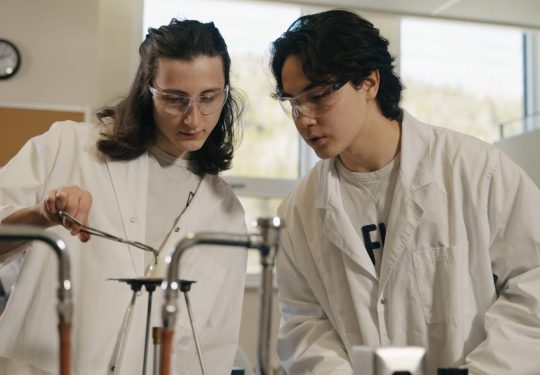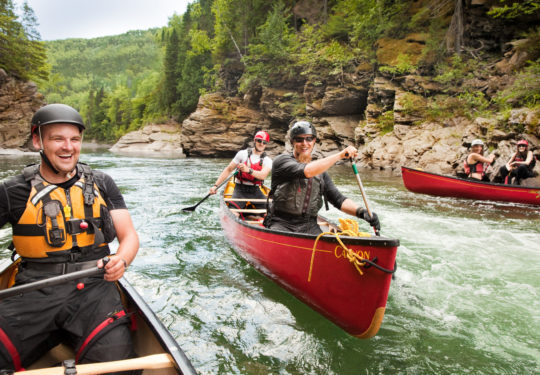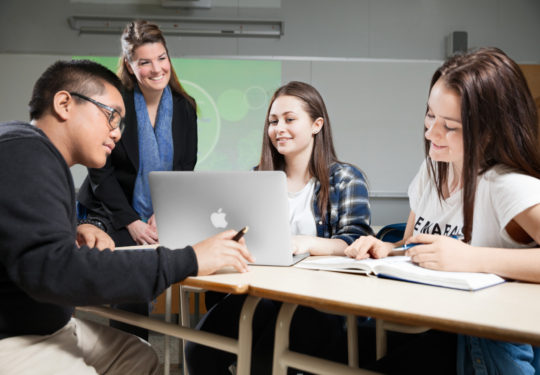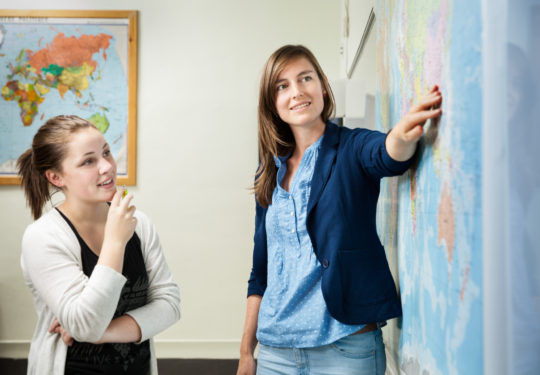Natural Sciences
- Diploma : Pre-University
- Duration : 2 years
- Quota : No
- Program Code : 200.3B
Program with the possibility of a $15,000 scholarship: Learn more
Program description
Interested in a career in science? Passionate about health, engineering, and the environment? You want to understand the natural phenomena that surround you? Our program is for you! We will guide you in developing your scientific thinking, your logic and your skills in chemistry, biology, mathematics, and physics. Classroom, laboratories, and field activities are offered by a dynamic and dedicated team.
Choosing to Study Here
- Choose from two profiles: Health Sciences or Pure and Applied Sciences, in order to better prepare for university.
- Enjoy scientific excursions in our unique wildlife environment, where mountains meet the sea.
- Engage in stimulating discussions with your professors about current topics in science.
- Acquire scientific knowledge through hands-on projects.
Second Language Immersion
Follow an individualized program by taking courses in French and in English. Find out more. Learn more
Adventure-Studies
Integrate daily outdoor activities into your schooling and obtain sport certfications upon obtaining your DEC with our Adventure Studies option. Learn more
Your University Studies
The university programs available to you with a DEC in Natural Science are:
- Health (audiology and speech therapy, chiropractic, diet and nutrition, occupational therapy, kinesiology, medicine, dentistry, veterinary medicine, optometry, pharmacology, speech-language pathology, etc.);
- Research (biochemistry, bioinformatics, biology, chemistry, math, physics, etc.);
- Actuarial Sciences, Finance, Economics, Commerce, Statistics,
- Architecture, industrial design, etc.;
- Computer Science (Programming, Data Structures and Algorithms, Infrastructure, Operating Systems and Networking, Web applications)
- Geography and the environment (agronomy, forest management and environment, geodesy, geology, geomatics, meteorology, environmental science, etc.);
- Engineering (mechanical, chemical, electrical, civil, physical, industrial, aerospace, computer, geological, mining, etc.);
- Science education (teaching high school, college, university);
- And all other university programs that require a DEC to be admitted.
Course Schedule
First Semester
27 hours/weekDifferential Calculus 201-SN2-RE
The course will teach you to apply the methods of differential calculus to the study of functions and to the solution of problems. You will be able to recognize and describe the characteristics of a function, determine if it has a limit, is continuous, is derivable, at a point and on an interval. You will also learn to apply the rules and techniques of derivation, to use the derivative and related concepts to analyze the variations of a function and to draw its graph. Finally, you will be able to solve optimization and rate of change problems.
General Chemistry 22-SN1-RE
Chemistry is a very important division of science. In fact, chemistry is the study of matter and its transformations, and, thus, is the basis for many phenomena observed in the other scientific domains. We, and the world around us, are composed of atoms that combine in definite proportions to form, not only, molecules that are essential to life, but also to form a variety of compounds and materials with different properties, some of which may be harmful.
The study of general chemistry allows a one to develop a better understanding of the principles governing the composition and transformations of matter. This course aims to deepen the understanding of the atomic model, intermolecular and intermolecular bonds, as well as the properties and reactions of matter.
Cellular Biology 101-SN1-RE
This course focuses on the basic units of life: cells. Through the study of their structures, you will discover the mechanisms of energy production, protein synthesis and cell reproduction. You will also elucidate mechanisms of genetics and heredity. The course includes laboratory activities using modern biotechnologies, for example, DNA amplification (PCR), plasmids, electrophoresis, etc.
Physical Activity and Health 109-101-MQ
This course focuses on the relationship between physical fitness, healthy and active lifestyle, and health. You will have to experiment with one or a few physical activities and relate them to your ability to adapt to exercise, your needs to change or maintain your physical condition, your motivation, your lifestyle habits, and your knowledge regarding prevention, in order to make a relevant and justified choice of physical activities.
Knowledge 345-101-MQ
Knowledge aims to introduce students to critical thinking in philosophy and the humanities more generally, as well as to initiate them to the practice of rational argumentation in written form. The course is divided in two parts: methodology and theory. In the methodology classes, students will learn how to identify concepts, arguments and parts of arguments, how to define their own concepts properly and produce their own arguments, and how to write an argumentative essay. In the theory section, we cover the beginnings of critical thinking in philosophy through the works of Plato, Aristotle and the Greek skeptics. Then we cover the developments of theories about knowledge in Descartes, Locke and Hume.
Introduction to College English 603-101-MQ
Introduction to College English is the first course in the Language of Instruction and Literature component of the General Education profile. It is designed to help students make the transition from high school English courses and to improve their writing and analytical skills necessary for college English. One aim of the course is to explore works of literature in detail and, on a cultural level, to attempt to find their relationship to our world and our lives. Students will read and examine the literary elements necessary to critical thinking and analysis. The second goal of the course is that students learn to organize their ideas in the form of a formal essay, to develop effective thesis statements, to write in a coherent and organized style, and support their arguments with appropriate references from the text.
Elective Course 1 COM-001-03
Description to come.
Second Semester
25 hours/weekIntegral Calculus 201-SN3-RE
The course will teach you to apply the methods of integral calculus to the study of functions and to problem solving. You will be able to calculate the limits of functions with indeterminate forms, determine the indefinite integral of a function, and calculate the indefinite and improper integral of a function over an interval. You will also translate concrete problems into differential equations, solve simple differential equations and calculate volumes, areas, and lengths. Finally, you will learn to analyze the convergence of series.
Chemistry of Solutions 202-SN2-RE
Chemistry is a very important division of science. In fact, chemistry is the study of matter and its transformations, and, thus, is the basis for many phenomena observed in the other scientific domains. We, and the world around us, are composed of atoms that combine in definite proportions to form, not only, molecules that are essential to life, but also to form a variety of compounds and materials with different properties, some of which may be harmful.
The study of the chemistry of solutions allows one to develop a basic understanding of the properties of solutions and the transformations accompanying such solutions. This course aims to deepen the understanding of different concepts and phenomena particular to solutions, such as calculations and units associated with the concentrations of solutions, colligative properties, chemical equilibrium, etc.
Mechanics 203-SN1-RE
The course will give you a better understanding of the major laws governing motion in the macroscopic world (laws of classical mechanics) and the major principles of conservation. Through these laws and principles, you will be able to describe the past motion and predict the future motion of an object. You will see how these equations can be used in ballistics, transportation, aeronautics, engineering, etc.
Probability and Statistics 201-SN1-RE,
During your university studies, and later in your profession, you will have to use numerical and non-numerical data from experiments or surveys. These data are the basic material from which information is obtained and decisions are made. In order to understand and interpret this type of information and make a sound decision, it is essential to know how to condense and statistical present data, how to analyze, interpret, draw conclusions, and decide based on the information presented. The statistical tools make it possible to read, with a critical eye, the numerical and non-numerical information. It allows for the understanding and proper conduct of experiments, investigations, and research.
Programming in Science 420-SN1-RE
The course will enable you to develop computer programs to automate problem solving in a scientific context. You will
be introduced to the basic concepts of programming using an interpreted language (Ex: Python). You will practice the
use of variables and arrays, control structures (conditions, loops, etc.) as well as the construction of functions. Thus, you
will eventually be able to translate basic algorithms into code.Physical Activity and Effectiveness 109-102-MQ
This course is about the process of improving effectiveness through an objective-based approach in the context of a sport, expression, or outdoor activity. You will need to take an initial survey and assess your skills and behaviors regarding the practice of physical activity, set goals and interpret your progress to improve. This course aims to empower you by taking charge of your apprenticeships required for your improvement in the practice of physical activity.
Literary Genres 603-102-MQ
Literary Genres is the second course in the Language of Instruction and Literature component of the General Education profile. Students will continue to develop the skills and abilities broached in Introduction to College English but will broaden their understanding of English literature by reading different literary genres (poetry, drama, prose) from different cultural and historical contexts.
Third Semester
27 hours/weekLinear Algebra and Vecto Geometry 201-SN4-RE
The course will teach you to apply the methods of linear algebra and vector geometry to problem solving. It will allow you to translate concrete problems into linear equations and to solve systems of linear equations using matrix methods. You will be able to make connections between geometry and linear algebra, establish the equation of geometric locations (lines and planes), determine their intersections, and calculate angles, distances, areas, and volumes. Finally, you will learn to prove propositions and construct representations of geometric locations in the plane and in space.
Electricity and Magnetism 203-SN2-RE
The course will introduce you to the many electrical and magnetic phenomena that make up our everyday lives. You will study the effect of the electrical charge of protons and electrons, understand how electrical circuits work, and become familiar with magnetism and some of its applications. At the end of this course, you will be able to solve some electricity and magnetism problems in various fields related to natural sciences.
Ecology and Evolution 101-SN2-RE
This course will bring you to question and analyze the many interactions between living beings inhabiting the Earth: What is the origin of life? How does an ecosystem work? How can we explain the current biodiversity? What are the impacts of human activities on the interactions between living beings and on their environment? Laboratory and field activities will answer these questions and many more.
Choice of 1 out of 2 Click here to see
201-224-GA, Mathematical Applications
This course is offered to students in the Natural Sciences program who wish to pursue university studies in pure sciences, applied sciences, or engineering. You will cover topics such as logic and methods of proof, complex numbers, and some special geometric locations. These topics are not covered in the four compulsory mathematics courses in the Natural Sciences program. Yet, these topics are very important if you are heading to a university program where mathematics plays a fundamental role in the training.
202-SNU-RE, Organic Chemistry
One need only think of a hot cup of coffee in the morning, a Red Bull during a sleepless night of study, or Tylenol to soothe a throbbing headache to realize the important role that organic chemistry plays in our daily lives. Clearly, knowledge of organic chemistry is important in the pure sciences, engineering, medicine, pharmacology, and other biomedical sciences. This first course provides fundamental knowledge of organic compounds, their chemical and physical properties, as well as their reactivity. Laboratory sessions introduce the basic experimental techniques of organic chemistry, such as synthesis, isolation, purification, and characterization of organic compounds. This course lays the foundation for understanding and appreciating much of biochemistry, pharmacology, and physiology. This course is obligatory for certain university programs in the Health Sciences, for example Medicine, Dentistry, Nutrition, Optometry, Pharmacy, Physiotherapy, ergotherapy, midwifery, etc.)
Physical Activity and Autonomy 109-103-MQ
This course is designed to help you integrate physical activity into your lifestyle, including better management of the factors that facilitate this integration. During the supervised practice, you will apply the previous apprenticeships by practicing physical activity regularly and sufficiently from a health perspective, on the one hand, and by planning, carrying out and evaluating a personal physical activity program that you have the opportunity to practice and validate under the supervision of the teaching staff, on the other.
World Views 345-102-MQ
World Views builds on the critical thinking and writing skills acquired in Knowledge. Its aim is to introduce students to a number of world views held by different groups at different points throughout history. We will cover four world views: the scala naturae, which places human beings within a larger, continuous cosmos ordered from matter to intelligent life; the geocentric model, which places the Earth at the center of the cosmos and makes human experience a universal reference point; the Copernican Revolution, through which the Earth was understood to revolve around the sun and by which human experience was similarly decentralized; and the possible worlds, according to which many distinct worlds, similar but not identical to ours, may exist either literally or as a speculative instrument. At the end of the course, students will be asked to write a philosophy essay comparing two world views on some determined topic.
Literary Themes 603-103-MQ
Literary Themes is the third course in the Language of Instruction and Literature component of the General Education profile. Students will use the skills and knowledge gained in Introduction to College English and Literary Genres to improve their interpretation and explanation of literary texts and to better understand the importance of context in the production of literature. Moreover, this course broadens the cultural value of literature through its choice of texts and the examination of a key theme within the readings.
French SL, Common GE 602-1XX-MQ
The focus of these courses is to improve students’ ability to communicate in French through their daily outings and to better understand the language. The students will be developing their writing, speaking, listening and speaking skills while working on different projects.
Fourth Semester
25 hours/weekWaves, Optics, and Modern Physics 203-SN2-RE
The course will focus on various concepts, such as wave phenomena and interference and diffraction phenomena. The last part of the course will take you through modern physics, focusing mainly on the quantum and nuclear physics. At the end of the course, you will be able to solve problems related to waves, optics, and modern physics in various fields of natural sciences.
Choice of 1 out of 3 Click here to see
101-SNU-RE, Human Anatomy and Physiology
At the end of this course, you will be able to explain how the human body is kept alive and healthy through the nervous, endocrine, digestive, cardiovascular, respiratory, urinary and immune systems. Dissection and microscopy activities are planned. Successful completion of this course is mandatory for admission to certain university programs in the Health Sciences.
201-234-GA, Advanced Calculus
This advanced calculus course is offered at the fourth semester to students in the Natural Sciences program who wish to pursue university studies in pure sciences, applied sciences, or engineering. It allows students to increase their knowledge of mathematics and facilitates their transition to university.
The first two calculus courses (Differential Calculus and Integral Calculus) were applied to functions of one real variable. In this Advanced Calculus course, you will develop the concepts of partial derivative and multiple integrals of a function of several real variables. You will study in depth functions of two or three variables and mention the generalization of results to functions of several variables. The last part of the course will be devoted to solving different types of differential equations of order 1 and degree 1.
Comprehensive Assessment
360-233-GA, Integration Project in Science
At the end of your cégep career, it’s now up to you! Working as part of a team, you must demonstrate an integration of the knowledge and skills you have gained in the Natural Sciences Program by designing project of scientific nature. You must then carry out this project and present it to your peers and to a team of professors. You have the choice to do your project in 1 of 2 profiles:
- Chemistry and Biological Sciences profile
- Physics and Engineering profile.
Comprehensive Assessment - Choice of 1 out of 3 Click here to see
201-295-GA, Probability, Statistics and Comprehensive Assessment
This course is offered at the fourth semester of the Natural Sciences program. It is divided into two parts. It includes a disciplinary part reserved for probability and statistics. It also serves as a capstone course for the Comprehensive Program Examination (Épreuve synthèse de programme, ÉSP).
During your university studies, and later in your profession, you will have to use numerical data from experiments or surveys. This data is the basic material from which information is obtained and decisions are made. In order to understand and interpret this type of information and make a sound decision, it is essential to know how to condense and present numerical data, how to analyze, interpret, draw conclusions, and decide based on the information presented. The statistical tool makes it possible to read, with a critical eye, the numerical information. It allows for the understanding and proper conduct of experiments, investigations, and research.
202-295-GA, Organic Chemistry II and Comprehensive Assessment
This course extends the study of structure, mechanism, and synthesis in organic chemistry. Invaluable skills relevant to all science professions, such as analytical reasoning, critical thinking, communication (oral and written), teamwork and autonomous learning are honed through a series of experimental projects and active-learning sessions. Several new analytical and spectroscopic techniques for analyzing organic molecules and determining molecular structure are explored. The experience gained is a wonderful capstone to a successful Cégep performance while providing a stepping-stone to university studies in the health sciences, such as medicine, pharmacy, physiotherapy, and nutrition.
203-295-GA, Statics, Resistance of Materials and Comprehensive Assessment
If you are going into applied science or engineering, this course is for you! It constitutes the point of convergence of mechanical physics and applied mathematics. By the end of the course, you will be able to build your own structure, understand its elements, and predict its behavior. You will gain a deeper understanding of statics, learn about strength of materials, and study basic structural components such as beams and columns.
Humanities in Sciences and Technology 345-C03-GA
The course provides students with a multi-disciplinary understanding of the nature of ethics and contemporary ethical issues. Students will apply the critical thinking skills they have acquired in Knowledge and World Views to problems and cases pertaining to their field of study (i.e. science and technology). The course is divided in three parts: a methodological part, a theoretical part and a part dedicated to case studies. In the methodological part, students cover the following notions: descriptive claims (based on facts and values) and prescriptive claims and their role in argumentation on ethical issues; evaluation and interpretation of arguments in ethics; analysis of ethical problems; application of argumentation to case studies in ethics. In the theoretical part, students are introduced to three theoretical frameworks to analyze ethical problems and case studies: virtue ethics, deontology and consequentialism. The final part of the course is dedicated to the study of particular cases and will vary depending on student projects.
English: Pre-University 603-C04-GA
Pre-University English will prepare students for the transition to university by exploring several approaches to primary and secondary research and practice assimilating and synthesizing research into research essays and oral reports. Students will develop a sense of ethical academic practices, a familiarity with the reference style used within their respective fields, and develop critical reading skills based upon readings from a broad range of topics. Students will also practice incorporating media and technology into their research by considering their audience and how to best communicate their research to a broad public.
French Second Language, Applied 602-CXX-MQ
The focus of this course is to improve students’ ability to communicate in French, mostly in a job-related setting. The students will develop their writing, speaking, listening and speaking skills while working on different projects related to their field of study.
Elective Course 2 COM-002-03
Admission Conditions
General Conditions
Possess a secondary school diploma or a secondary school vocational diploma and have successfully completed the following courses:
- Language of Instruction – Secondary 5
- Second Language – Secondary 5
- Mathematics – Secondary 4
Special Conditions
Secondary 5 Physics
Secondary 5 Chemistry
Secondary 5 Maths Technical-science or Science option
For more information
Communications and International Activities Department
418-368-2201, ext. 1381
1-888-368-2201, ext. 1381
information@cegepgim.ca





